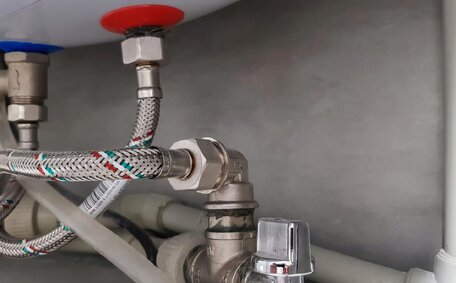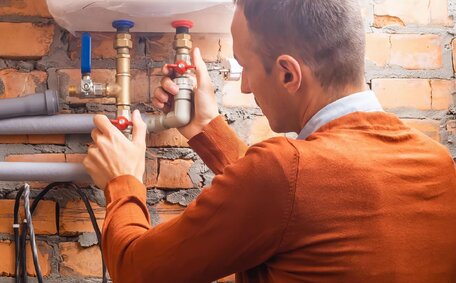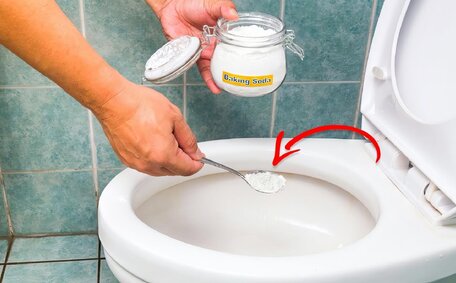Identifying Valuable Components for Recycling
When disposing of your water heater, like an old heat pump system, there are valuable metals and parts worth salvaging for recycling.
The materials inside the tank, often steel, copper, and aluminum or brass, can be recycled. Inside, components like an anode rod, can be recycled, reducing the waste stream. Recycling metal components from water heaters not only reduces waste but can also alleviate potential environmental and financial challenges.
For non-recyclable parts, consider engaging a professional service such as North Epping Plumbing for secure disposal. Our skilled technicians can also ensure safe removal and disposal of water heater components, aiding in the responsible elimination of your unwanted elements.
Contact us to pinpoint valuable metals and potentially energy star certified components, such as:
- Copper pipes and fittings
- Brass valves and fittings
- Steel tank body
- Aluminium or magnesium anode rod
Corrosion often hinders the recycling process of non-functional water tanks over 10 years old, necessitating professional evaluation and removal. Our technicians can evaluate your water tank and handle their removal and recycling disposal responsibly for your household.
Safely Draining and Disconnecting the Old Unit
It’s essential to safely drain and disconnect when replacing your system’s heater. Follow these critical steps to safely remove a water heating system:
- Turn off water supply sources and power sources like electricity and the gas hot water system. Shut off the gas line to extinguish the pilot light, and flip the circuit breaker.
- Attach a garden hose to the drain off valve to remove water near the bottom of the tank.
- Once fully drained, take your disconnected lines and ensure they are disposed of properly away from the heater.
- Check your owner’s manual for model-specific disconnecting tips.
- Pondering 'Do I require professional help?' Make sure to consult our professional team at North Epping Plumbing for assistance. Rely on our technicians’ expertise for the safe disconnection and replacement of your water heater.
Disconnecting lines from your new water heater without expertise may lead to leaks, electrical shocks, or explosions. Let our licenced plumbers handle this hazardous work while you focus on selecting a more efficient, eco-friendly new water system.
Finding Reputable Metal Recyclers
To find reputable recycling centres that accept old hot water systems in your area, check out our guide with the following steps:
- Use your devices to search online directories like RecyclingNearYou.com.au for local drop-off points in your vicinity.
- Verify if the centre accepts water heaters and components by checking their website or by calling in advance. Ask how much the fees are.
- Select facilities with positive reviews, feedback from past customers, and free drop-off capabilities.
- In some cases, inquire if they offer financial compensation for valuable scrap metals recycled.
- Choose centres promoting environmental stewardship and ethical practises when processing materials.
Recycling metals from water heaters helps lessen landfill waste. It also ensures hazardous components are managed through safe disposal practices, reducing environmental harm over time. Support facilities that prioritise sustainability in their operations and offer reasonable compensation for materials such as old water heaters.
Scheduling Council Hard Rubbish Collection
To arrange a council hard waste collection for an old hot water system in the North Epping area, reach out to your local recycling center and follow these steps:
- To arrange pickup, reach out to the Hornsby Shire Council Waste Hotline at 9847 4856 or via [email protected].
- Verify you are eligible for a pickup and that hot water heaters are accepted as hard waste items.
- Ask about scheduling pickup services and specifics like pick-up dates, where to place items, quantity limits, and any applicable fees.
- Council usually offers two scheduled household waste collections annually. Prepare your unit by draining all water and setting it out by your kerbside bin, making sure to remove valuable components for recycling beforehand.
- On your scheduled date, set your hot water system at the curb for collection before 6am. Council trucks will take your old items for disposal that day.
Adherence to council hard waste policies ensures correct pickup and disposal.
Comparing Scrap Metal Collector Prices
Obtaining quotes from various scrap yards for your recyclable old hot water system ensures you get the best deal. Here are some tips for comparing offers that may involve copper steel alloys and other valuable materials:
- Contact a minimum of three local recycling businesses, describe your appliance, and enquire about disposal options. Inquire if they purchase hot water systems and components.
- Ask what forms of payment they offer - some provide cash payments whereas others may give account credit.
- Compare location distances to determine fees associated with drop off services or pickups. Closer centres generally offer more competitive disposal service charges.
- Consider reputation via online reviews and business longevity when selecting.
- Verify any required safety preparations on your end to drain systems and remove hazardous parts ahead of transportation.
- Prioritise licenced, ethical facilities promoting sustainability through recycling.
Assess quotes to find the best deal for the green disposal of your water heater.
Deciding On DIY Removal vs Professional Services
Choosing between DIY removal or hiring a professional service depends on evaluating the complexity, your skill set, and the associated risks.
While a DIY approach may appear cost-effective, proper disposal knowledge is critical to safeguard your home. One thing to consider is hazards that include electric shocks, gas leaks, floods from botched draining, and injuries from broken tanks or heavy lifting.
Calling qualified technicians takes more planning but is the safest way to get rid of your old appliances.
- Safely switch off gas, power and water connections
- Fully drain off your old system from pipework
- Extract recyclable parts you keep for compensation
- Transport the discarded unit for eco-friendly disposal
Expert handling of all risks prevents endangering yourself and your family during the management of your water heater. Our transparent quotes for installation services allow financial planning, avoiding unexpected costs from potential DIY errors.
Wondering what do if you’re uncertain about self-removal of your new hot water system? Contact our North Epping team for advice tailored to your situation.
Choosing Eco-Friendly Disposal Methods
Some methods to consider include:
- Consider the option to give away your old system to charities like the Smith Family if it’s still functional. They refurbish appliances and provide new hot systems to families in need.
- Selling on Gumtree or Facebook Marketplace for someone to reuse.
- Finding retailers that offer trade-in programmes to upgrade your system.
- Recycling tanks, copper pipes and components through ethical scrap metal buyers.
- Utilising council hazardous waste days to properly dispose of hazardous items like unwanted paint and household chemicals.
Opt for the most sustainable disposal avenue, considering your system’s working condition. We recommend contacting North Epping Plumbing to inspect your model and advise the best eco-friendly disposal method.
As your local waste experts, we help the North Epping community make environmentally responsible choices concerning hot water system replacements or removals. Together, with proper appliance removal techniques, we can reduce landfill waste, contributing to a more sustainable future.
Understanding Disposal Laws and Regulations
When disposing of a hot water system in the North Epping and greater Sydney area, there are important laws and regulations to follow for safe, legal and environmentally responsible disposal.
Key Laws
In NSW, certain gas water heater components are deemed hazardous, capable of emitting substances into the atmosphere. Improper disposal of these items could result in environmental contamination and substantial fines for individuals or corporations.
Hazardous items, including mobile device batteries, must be managed by licensed services like North Epping Plumbing. Our technicians safely remove dangerous components before these materials are disposed your responsibility.
Other regulations for the disposed of your items include:
- Tanks can only be collected for metal recycling once certified gas-free and drained of hazardous liquids
- Asbestos storage and transport requires licences and specialised equipment
- documentation must track appliances from removal to final disposal
Council Waste Policies
Local councils like Hornsby Shire also implement appliance disposal policies residents must comply with. Adhering to these practices is crucial for responsible waste management that helps divert waste from landfills.
Key requirements may involve:
- Booking hard rubbish collection appointments for tanks
- Separating hazardous parts for special handling
- Following set collection days and location procedures
- Paying any fees for waste transportation/disposal
Violating council regulations can prompt fines alongside environmental and community impacts of irresponsible disposal.
Ethical Handling
Apart from adhering to legal directives, factor in sustainability and social responsibility during water system disposal in North Epping.
Choosing to donate, refurbish or recycle tanks demonstrates environmental awareness. Opting for licenced, ethical disposal services like North Epping Plumbing also promotes worker safety and responsible appliance handling.
Contact our team to learn more about the latest requirements concerning hot water system disposal. We’re happy to guide you through the disposal options while meeting all legal and ethical expectations.
Safety Tips for Moving and Dismantling
Moving and dismantling a hot water system on your own can be difficult and dangerous due to the heavy weight and hazardous materials involved. Here are some key safety tips:
Safe Lifting Practices
- Always bend knees and keep back straight when lifting
- Hold the load as close to your body as possible before standing up
- Avoid twisting motions - move your feet instead
- Use leverage from walls when turning the unit
- Wear steel-toe boots and gloves for foot and hand protection
Equipment
- Employ appliance hand trucks and secured dollies for safe movement
- Place plywood under units when dragging across floors to prevent damage
- Have helpers assist with lifting and navigating doorways/stairs
Dismantling
- Ensure all water and gas/power are disconnected by a professional beforehand
- Refer to manufacturer guidelines for model-specific dismantling instructions
- Remove valuable metals and parts first for recycling
- Wear PPE like dust masks, ear plugs and safety goggles
Should you feel the task is unsafe, cease immediately and contact our professional team at North Epping Plumbing for assistance. Our trained, licenced technicians can handle all hazardous materials and lifting to avoid injuries.






